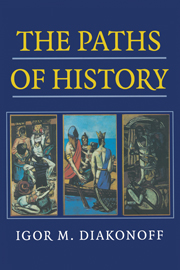Book contents
- Frontmatter
- Contents
- Foreword by Geoffrey Hoskins
- Preface
- Introduction
- 1 First Phase (Primitive)
- 2 Second Phase (Primitive Communal)
- 3 Third Phase (Early Antiquity)
- 4 Fourth Phase (Imperial Antiquity)
- 5 Fifth Phase (the Middle Ages)
- 6 Sixth Phase (the Stable Absolutist Post-Medieval Phase)
- 7 Seventh Phase (Capitalist)
- 8 Eighth Phase (Post-Capitalist)
- Index
4 - Fourth Phase (Imperial Antiquity)
Published online by Cambridge University Press: 02 December 2009
- Frontmatter
- Contents
- Foreword by Geoffrey Hoskins
- Preface
- Introduction
- 1 First Phase (Primitive)
- 2 Second Phase (Primitive Communal)
- 3 Third Phase (Early Antiquity)
- 4 Fourth Phase (Imperial Antiquity)
- 5 Fifth Phase (the Middle Ages)
- 6 Sixth Phase (the Stable Absolutist Post-Medieval Phase)
- 7 Seventh Phase (Capitalist)
- 8 Eighth Phase (Post-Capitalist)
- Index
Summary
The crisis of the societies of the Third Phase was induced by the fact that in each of these societies the growth of the surplus produce, began after civilisation's first brilliant success, to slow down and even come to a halt.
The productivity of labour had grown considerably during the Third Phase. This was connected with the introduction of irrigation in agriculture, but also with new achievements in the field of handicrafts: smelting of copper and later iron ore, elaboration of the technology of bronze, introduction of the plough, the potter's wheel, the weaver's loom, digging of irrigation canal systems, the invention of the first water-raising constructions. But later the productivity did not grow, and sometimes it slowed down. Thus, in Mesopotamian agriculture, because of the impoverishing and salinisation of the soil, which was the result of injudicious irrigation, the more valuable cultures (e.g. wheat) were ousted by the less valuable (e.g. barley). The growth of the ratio of exploitation has its natural limits: a certain improvement in hand-tools could not bring about any considerable growth in the output of manual labour.
Finally, the last reserve of the quantitative growth of the produce – natural population growth – was also being exhausted. During the Second (Primitive Communal) and the Third Phase (that of Early Antiquity), the growth of the population was considerable compared with the First (or Primitive proper) Phase, and we can observe an increase in inhabited places. But with the beginning of urbanisation we encounter the general law of all progress: one has to pay for it, and the cost begins finally to be higher than the benefit.
- Type
- Chapter
- Information
- The Paths of History , pp. 37 - 55Publisher: Cambridge University PressPrint publication year: 1999



